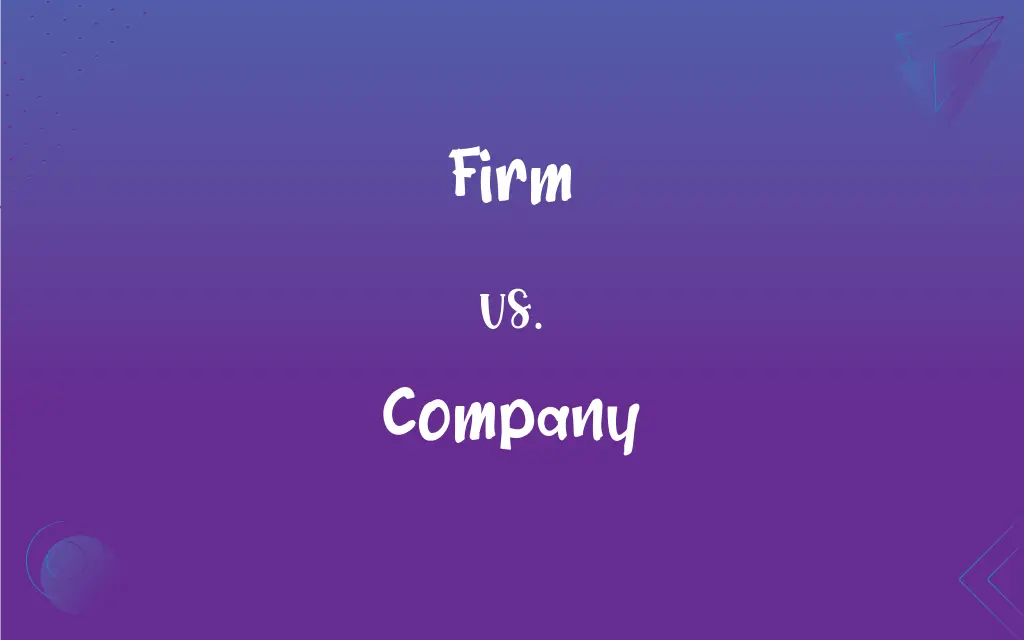Firm vs. Company: What's the Difference?
Edited by Aimie Carlson || By Janet White || Updated on November 28, 2023
A firm is a business entity, often used to describe professional service providers, while a company is a broader term for any commercial business.

Key Differences
The terms "firm" and "company" are often used interchangeably in business contexts, but they can have distinct meanings based on legal structure and usage. A "firm" traditionally refers to a business entity, particularly in the fields of law, accounting, or consulting, and is often used to describe partnerships or sole proprietorships. A "company," however, is a broader term that encompasses any type of business entity, including corporations, limited liability companies (LLCs), and partnerships. This distinction is important in understanding the legal and operational structure of the business entity.
In terms of legal structure, the differences between a firm and a company become more pronounced. A firm, especially when referring to a partnership, implies a group of individuals working together in a business or professional practice, where they share liability and profits. On the other hand, a company, particularly a corporation, is a separate legal entity from its owners, providing limited liability protection to its shareholders. This legal distinction impacts the risk exposure of the owners and the formalities required in running the business.
The terminology used in different regions and industries also highlights the difference between a firm and a company. In many English-speaking countries, the term "firm" is more commonly associated with professional services like law firms or accounting firms, suggesting a partnership model. In contrast, "company" is a more universal term that can refer to any business entity, regardless of its legal structure, and is often associated with larger, corporate entities. This usage reflects the traditional origins and current perceptions of these terms in various business sectors.
When it comes to public perception and branding, firms and companies may convey different images. A firm, with its connotations of partnership and collaboration, often suggests a more personal, client-focused approach, commonly seen in professional services. A company, particularly a large corporation, might evoke a sense of a more extensive, possibly multinational operation, with a complex organizational structure. These perceptions can influence customer expectations and the marketing strategies of the business.
The financial and operational aspects of firms and companies can also differ significantly. Firms, particularly partnerships, often have simpler operational structures with direct involvement of the owners in day-to-day management. Companies, especially corporations, tend to have more complex operational structures with a clear separation between ownership (shareholders) and management. Financially, firms might have different methods for raising capital, often relying on personal contributions from the partners, whereas companies have more options, including issuing stocks and bonds. These differences reflect the varying scales and complexities of firms and companies.
ADVERTISEMENT
Comparison Chart
Typical Usage
Professional service providers
All types of commercial businesses
Legal Structure
Often partnerships
Includes various structures like LLCs, PLCs
Scale and Scope
Smaller, specialized operations
Ranges from small to multinational
Ownership/Management
Often the same individuals
Can be separate, especially in larger entities
Industry Application
Common in law, accounting, consulting
Used universally across all sector
ADVERTISEMENT
Firm and Company Definitions
Firm
A business entity, often specializing in professional services.
The law firm has a reputation for excellent legal counsel.
Company
A legal entity formed to conduct business and generate profit.
She started her own company to sell handmade crafts.
Firm
A term often associated with the legal, accounting, and consulting industries.
The accounting firm audits several major corporations.
Company
Any commercial business entity, regardless of size or industry.
The company has grown rapidly in the tech sector.
Firm
Refers to a business with a specific expertise or focus.
Their architectural firm specializes in sustainable design.
Company
Can refer to a corporation with shareholders and a board.
The company went public last year, offering shares on the stock market.
Firm
A partnership or business characterized by its service orientation.
Their consulting firm provides expert business strategies.
Company
Often used to describe larger, more established businesses.
The company is one of the leading manufacturers in the industry.
Firm
Sometimes used to describe a small or medium-sized business.
The firm has been family-owned for three generations.
Company
A term that encompasses various business structures and models.
The company operates both locally and internationally.
Firm
Resistant to externally applied pressure.
Company
A group of persons
A company of scientists.
Firm
Marked by or indicating the tone and resiliency of healthy tissue
Firm muscles.
Company
One's companions or associates
Moved in fast company.
Is known by the company she keeps.
Company
A guest or guests
Had company for the weekend.
FAQs
Do companies have to be registered?
Yes, companies typically require legal registration.
Are firms limited to certain industries?
They are commonly associated with professional services like law or accounting.
Can a company be a single-person entity?
Yes, especially in the case of sole proprietorships or single-member LLCs.
Can a firm be part of a company?
Yes, a firm can be a division or subsidiary within a company.
Is a firm always a legal entity?
Yes, a firm is a legal entity, often a partnership.
Do firms have shareholders?
Not typically; firms, especially partnerships, have partners instead.
Are all businesses considered companies?
Most commercial entities are referred to as companies.
What is the management structure in a firm?
Management is often handled by the partners themselves.
Do companies have to disclose financial information?
Public companies do, but private companies have fewer disclosure requirements.
Is a firm considered a corporate entity?
Not in the traditional sense, as it's often a partnership or sole proprietorship.
Is a company bigger than a firm?
Not necessarily, though 'company' often implies a larger scale.
Can a sole proprietorship be called a firm?
It's less common, as 'firm' often implies a partnership.
How is profit distributed in a firm?
Profit is typically shared among partners, based on the partnership agreement.
Can a company be publicly traded?
Yes, especially corporations can be publicly traded.
Do firms issue stocks?
Generally, no; stocks are associated with companies, especially corporations.
What is the tax structure for a firm?
It depends on the legal structure, but often profits are taxed as personal income.
Can a company be owned by another company?
Yes, this is common in cases of subsidiaries and holdings.
Is a startup a firm or a company?
A startup is a type of company, often innovative and growth-oriented.
Are companies always for-profit?
Most are, but there are also non-profit companies.
What types of companies are there?
There are various types, including LLCs, PLCs, and corporations.
About Author
Written by
Janet WhiteJanet White has been an esteemed writer and blogger for Difference Wiki. Holding a Master's degree in Science and Medical Journalism from the prestigious Boston University, she has consistently demonstrated her expertise and passion for her field. When she's not immersed in her work, Janet relishes her time exercising, delving into a good book, and cherishing moments with friends and family.
Edited by
Aimie CarlsonAimie Carlson, holding a master's degree in English literature, is a fervent English language enthusiast. She lends her writing talents to Difference Wiki, a prominent website that specializes in comparisons, offering readers insightful analyses that both captivate and inform.
































































